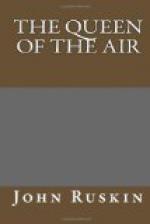form of violence, justifiable or not, as other violence
is, according to the character of the persons against
whom it is exercised, and the divine and eternal laws
which it vindicates or violates. We must not
burn a man alive for saying that the Athanasian creed
is ungrammatical, nor stop a bishop’s salary
because we are getting the worst of an argument with
him; neither must we let drunken men howl in the public
streets at night. There is much that is true
in the part of Mr. Mill’s essay on Liberty which
treats of freedom of thought; some important truths
are there beautifully expressed, but many, quite vital,
are omitted; and the balance, therefore, is wrongly
struck. The liberty of expression, with a great
nation, would become like that in a well-educated
company, in which there is indeed freedom of speech,
but not of clamor; or like that in an orderly senate,
in which men who deserve to be heard, are heard in
due time, and under determined restrictions.
The degree of liberty you can rightly grant to a number
of men is in the inverse ratio of their desire for
it; and a general hush, or call to order, would be
often very desirable in this England of ours.
For the rest, of any good or evil extent, it is impossible
to say what measure is owing to restraint, and what
to license where the right is balanced between them.
I was not a little provoked one day, a summer or
two since, in Scotland, because the Duke of Athol hindered
me from examining the gneiss and slate junctions in
Glen Tilt, at the hour convenient to me; but I saw
them at last, and in quietness; and to the very restriction
that annoyed me, owed, probably, the fact of their
being in existence, instead of being blasted away
by a mob-company; while the “free” paths
and inlets of Loch Katrine and the Lake of Geneva are
forever trampled down and destroyed, not by one duke,
but by tens of thousands of ignorant tyrants.
155. So, a Dean and Chapter may, perhaps, unjustifiably
charge me twopence for seeing a cathedral; but your
free mob pulls spire and all down about my ears, and
I can see it no more forever. And even if I
cannot get up to the granite junctions in the glen,
the stream comes down from them pure to the Garry;
but in Beddington Park I am stopped by the newly-erected
fence of a building speculator; and the bright Wandel,
divine of waters as Castaly, is filled by the free
public with old shoes, obscene crockery, and ashes.
156. In fine, the arguments for liberty may
in general be summed in a few very simple forms, as
follows:
Misguiding is mischievous: therefore guiding
is.
If the blind lead the blind, both fall into the ditch:
therefore, nobody should lead anybody.
Lambs and fawns should be left free in the fields;
much more bears and wolves.
If a man’s gun and shot are his own, he may
fire in any direction he pleases.
A fence across a road is inconvenient; much more one
at the side of it.




